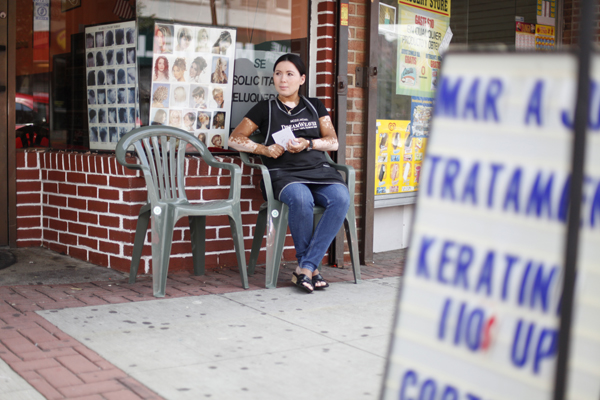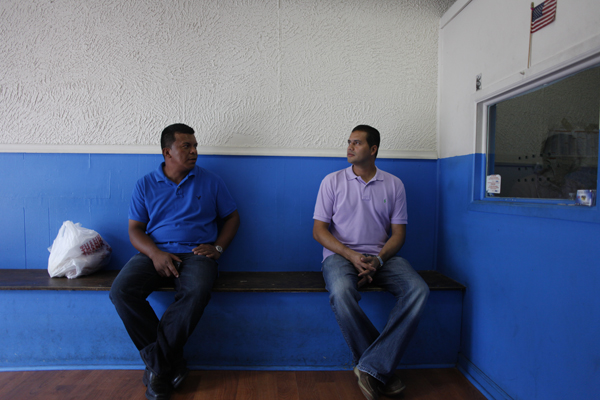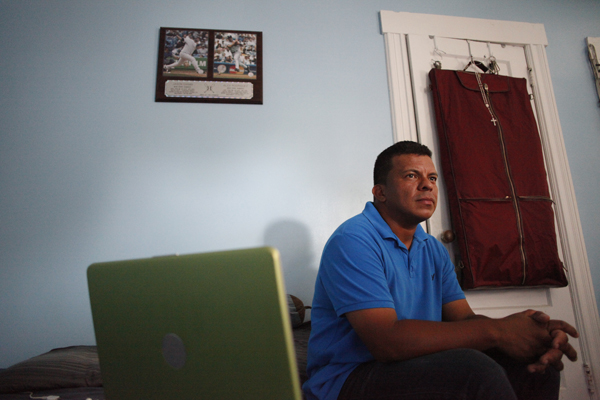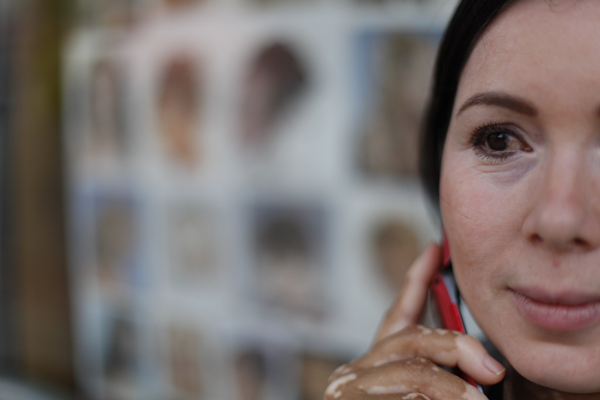|
 Sandra sits in front of the beauty salon to give away pamphlets to people who pass by on Aug. 15, 2012 in Plainfield, New Jersey.
Sandra sits in front of the beauty salon to give away pamphlets to people who pass by on Aug. 15, 2012 in Plainfield, New Jersey.
The pamphlets promote the services and low prices that the salon offers.
We walk from the train station toward a Guatemalan restaurant where we decide to have breakfast. It’s 11 a.m. on a summer day in August, a little late to be eating the first meal of the day, but Sandra, Miguel and Robert requested the day off of work to be with us, and they decided that before opening the doors to their private life, we should get to know each other briefly.
The restaurant is called Guatemala Linda. It serves Guatemalan food but it also serves “pinto.” It’s empty, with two televisions turned on, and the women that are serving us spend more time in the kitchen than paying attention to us. But we don’t care. After months away from Costa Rica, the mere possibility of once again tasting fried plantain, scrambled eggs and a tasty pinto with sour cream is all we want. And you have to take into account that we’ve only been outside of Costa Rica for a few
months… Miguel and Robert haven’t traveled to their homeland for seven years.
We are in Plainfield, New Jersey, an hour and a half by train from Manhattan, New York. A great majority of Hondurans, Guatemalans and Salvadorans live in the state of New Jersey. These are the three countries known as the most dangerous geographic triangle in the American continent. But there is also a small group of Ticos that live here.
Sandra, together with her cousin Miguel and his friend Robert, live and work in Plainfield and form part of the Costa Rican population who work illegally in the USA. (Last names will not be used to protect their identity).
Sandra and Miguel are from Nosara. They decided to leave their town for a city of small buildings with a Latin vibe but only cement around. Their motive for uprooting is the same as mostly all other immigrants that go to the United States: to make more money.
The level of unemployment in the United States isn’t at its best (7.7%) but, according to Sandra, “many (Americans) don’t want to work unless it’s in an office,” opening an important portal to immigrants, especially Latinos, to work in jobs considered “hard,” like cleaning, gardening and construction. For Sandra, “the treatment of immigrants from some people is racist. The Latino has to do the North American’s work, they treat him bad and if he doesn’t have papers they pay him
bad.”
 Robert, left, and Miguel wait at a taxi station to get ride home on Aug. 15, 2012 in Plainfield, New Jersey. The two, who live in the same
Robert, left, and Miguel wait at a taxi station to get ride home on Aug. 15, 2012 in Plainfield, New Jersey. The two, who live in the same
house, don't own their own vehicle and use taxis frequently for transportation.
Arriving in the United States
Sandra, 40 years old, has a fervent desire to see her 22-year-old daughter graduate in medicine from Universidad Latina (Latin University). She works between 10 to 14 hours a day. Sandra’s story is much like many Costa Rican adolescents that ended up pregnant. With help from her mom, who lives in Nicoya, and from her grandmother, who died a few weeks after this interview, they helped her move
ahead. The father of her daughter helps her economically, but according to Sandra “it’s not much.” So she studied cosmetology in San Jose and opened her own salon in Nosara in 1994, the first one in the town. But the salon wasn’t enough to achieve her daughter’s dreams, so she decided to head another direction.
She worked in the state of Texas during 2010, and in 2011 went to Southampton, an affluent high-class town in the state of New York, with the help of a North American couple that visits Nosara regularly.
In 2012 she decided to accept her cousin Miguel’s invitation to make money in Plainfield. There she found work in a salon. As an extra job, she cleaned house for an Argentine man. When I ask Sandra what she does in her spare time, she looks at me mockingly and asks, “What spare time?” When she’s in the United States, it’s to work.
Sandra’s situation is distinct. She only works in the United States during the low tourist season in Nosara, from May until October. She says it’s in there where she enjoys herself. “Here I don’t go out. In Nosara I do. There you know people, you know that if you’re going to drink, there’s always a friend to take you home. Not here.” In Plainfield, she tried to go out a couple of times with Miguel and Robert but she felt uncomfortable in the presence of “ficheras,” women, the majority Latinas, who receive a $10 token from a client to have a drink with them at the bar or at a table in the bar.
Sandra tells me that some of the salon’s clients have invited her to go out and that many of them are married or are military men on leave. Some have even offered to get her legal papers for permanent residency in the United States in exchange for a date, but she responds that it’s better not to. “I am very careful in this,” she assured.

MIguel watches TV while he also checks his facebook on Aug. 15, 2012 at his home in Plainfield, New Jersey. He said the NY Yankees picture on his wall was given to him by an American friend.
The High Cost of Making Money
Miguel and Robert went to the States together seven years ago, in 2005, and have never returned to Costa Rica. The risk of leaving the United States and not being able to enter again is stronger; they have a lot to lose: a stable job and good pay.
For the past three years, both have worked for a waste collection and classification company. They earn $480 per week, about 240,000 colones, making a total of $1920 per month, five times what a garbage collector and recycler in Costa Rica makes. They have two days off per week, but most of the time they spend those days doing other “little jobs” in restaurants, like washing dishes or cooking.
Yet, earning more money in a foreign country has its cost, especially when you come from a country where daily life is filled with family activities. “You pay the high price of not being with your family every day,” said Sandra.
When Robert decided to try his luck in the north, his son was only one year old. Leaving him was hard, but since he touched American soil, he sends him money every month.
The only one who has a family member nearby is Miguel. Miguel is the second to last of 12 siblings. His mom died at 61 in 1997 waiting for a liver transplant and now Miguel helps his 75-year-old father economically. One of his sisters arrived in New Jersey six years ago and married another Tico. Miguel sees them every two weeks, especially during summer, when they barbecue at a beach or a park.
The social life of the three is limited. They spend it on Facebook or watching television programs.
Being single and without children, Miguel, smooth and gentile, can indulge himself a little more by going out for a few beers and visiting New York City. I ask if he’s ever had trouble with immigration. “You don’t have problems if you don’t look for them,” Miguel responds. “I go around calmly.”
But for the most part, life for Miguel and Robert centers around work. The goal is to spend as little as possible, although this implies giving up one of the sports most enjoyed by Costa Rican men: soccer. They don’t play for fear of breaking a bone or hurting themselves and having to pay high medical bills. A few years ago, Robert had an infected molar and had to pay $850 for treatment. He said he doesn’t risk it now and only watches others play.
Putting Down Roots in a Foreign Country
But for other Ticos, living in the United States isn’t just about making money and returning to Costa Rica. Some build their lives right there in a foreign country to forge a future for them and their family.
Months after that hot August afternoon when we met Sandra, Miguel and Robert, now close to the cold Christmas in the north of the American continent, I meet the incredible Carmen Muñoz, a 64-year-old Nicoyan, married 42 years ago to her husband Luis Rodriguez and mother of her only daughter, Isabel Gonzalez, who was born in Heredia.
Grandmother of three, all born in the United States, Carmen has two jobs, one during the day and one at night. She sleeps little and when she’s awake, doesn’t have a moment’s rest. Her time is limited and precious. She can’t meet me personally, so we start a series of telephone interviews that extend for three months.
In one of them, Carmen quickly answers the phone, “I’m on the run, darling. The day after tomorrow I leave for Costa Rica to spend Christmas with my family.” Carmen sighs and says, “It’s been almost 30 years since we’ve spent it together.”
Carmen arrived in the town of Elizabeth in New Jersey in 1985. She had studied sewing at the University of Costa Rica but longed to learn technical design in the United States to set up a manufacturing business in Costa Rica. Her husband Luis, who worked for the Ministry of Agriculture, asked a leave of absence from the government to go to the USA for six months. His daughter was 16.
The arrived with $10,000 in their pockets, rented two rooms in a house and bought food out. After a few months, Luis told Carmen that they were going to stay to live there. They enrolled their daughter in school and Luis started studying gastronomy at New York University to later work in a restaurant for 19 years.
Carmen gave up her dream of starting a fashion business and got a job in an electronics factory where she assembled electronic parts for planes and computers. She did that for 12 years.
She fine-tuned her English with private classes and watching television, but during her first months she got by on the little she had learned in high school. At that time, speaking English was imperative for getting a job. Carmen related that people told her, “I’m sorry, this is America. You have to speak English.” The situation is different now. Miguel and Robert, after seven years of living in Plainfield, still don’t speak English.
In 1999, Carmen and Luis bought their first house. By then, their daughter had married Jose Gonzalez, also a Tico living in a foreign country. Isabel, while raising a family of three children under the protective wing of her parents, studied cosmetology, then bank administration and finally in February of 2013 she will graduate as a psychologist. Now she works during the day as a manager at Bank of America in Elizabeth while she studies at night.
In 2007, 22 years after arriving in the United States, Carmen and Luis obtained U.S. citizenship.
Toward the end of December of 2012, Carmen survived two heart attacks, three heart surgeries and carries the weight of type 2 diabetes. At 64, she owns two office cleaning service businesses in which she actively works. Carmen’s life philosophy is that “the flowerpot on the porch doesn’t advance, my dear. You have to move it,” and so she’s been moving pots one after another to get to where she is.
But when you ask her if she regrets having forged her life in another country, she admits “at times, yes. Although I have papers, the Americans never accept me… and when I go to Costa Rica I ask myself, ‘Why do I have to go back [to the United States]?’”

Sandra talks on the photo during her shift at the hair salon on Aug, 15, 2012.
Looking to the Future
Carmen hopes to retire in 2013 to be able to access her retirement account but she says she will continue working, although a little less because she wants to go to Costa Rica more often. For Carmen, living in the United States is “a school where you learn to mature, to defend yourself and to be able to live alone and depending on God. To draw closer as a family and to understand the people who are arriving. Here, either you learn and you float, or you sink.”
Miguel continues working at the waste collection company. He has a “sentimental” girlfriend but nothing serious; he doesn’t want to commit because he doesn’t want to stay in America. Now he’s thinking of taking an English class and returning to Nosara in two or three years to be a science teacher. Robert is returning to Costa Rica in January because he doesn’t want to be far away from his son anymore.
Sandra is in Nosara. Her house was completely destroyed by the earthquake on September 5th, so she hopes to go again to the States in March to make money and rebuild her house. “Everything has its price,” said Sandra. To her, the United States isn’t the country where she wants to live. She misses everything because for her, “there’s no life there.”
 |
| |
More Regional News
Repair Work Advances at Nicoya Hospital After Earthquake
The repair of damaged infrastructure in La Anexion Hospital in Nicoya, after the earthquake of September 5, 2012, has progressed 40% and it is estimated that it could be ready in May.
Proposal to Restructure Management of National Parks and Wildlife Refuges
The Ministry of Environment and Energy (Ministerio de Ambiente y Energía, SITRAMINAE) Workers Union and former Environment deputy minister, Mario Boza, announced that a new law aimed to restructure the management of national parks and wildlife refuges is being drafted.
TSE Pays Thousands of Dollars in Rent While Still Owing Rent to Municipality
Starting this year, the Tribunal Supremo de Elecciones (TSE- Electoral Supreme Court) will pay 1,332,000 colones ($2,664) per month in rent for the offices of the regional branch in Nicoya.
Taxes on “luxury” homes skyrocket up to 10x after readjustment of property values
A readjustment to construction values, made by the Ministry of Hacienda (Tax department), caused the taxes on “luxury homes,” (homes valued at about $234,000 USD and above) to increase between 57%-160% for this year, depending on the type of home.
Chamber of Hotels Parts Ways from CANATUR
The Costa Rican Chamber of Hotels (CCH) separated from the National Chamber of Tourism, CANATUR, for differences regarding the internal organization and after finding out about the poor financial management of the administration.
Lack of Fire Hydrants Causes Problems for Firefighters
“To put out a fire I draw water from the river, the sea, a pool or the well of a friend or neighbor. Here there are no hydrants”, explained Jo Pinheiro, describing the dramatic situation the Nosara firefighters go through when they need water to extinguish fires.
Technical Closure of Nicoyan Cemetery Begins
They finally demolished the boundary wall of the current municipal cemetery, thus initiating the long awaited technical closure.
Costa Ricans Consume 3 Kilograms of Agrochemicals Per Year
Costa Rica is currently one of the countries that uses large amounts of chemicals in its agricultural production, even using chemicals that are banned in other countries since they pose serious health risks.
Caja Intervenes at Nicoya Hospital for Administrative Mismanagement
The Board of Directors of the Costa Rican Social Security System (CCSS or Caja) decided to intervene starting December 27 at Nicoya’s Hospital de La Anexión for administrative mismanagement that has developed. Therefore there will be a transfer of the medical and financial directors to other venues in order to establish another work team for a year or more, according to the needs of the institution.
New Regulations for Liquor Licenses Should Be In Place By Late January
The Municipality of Nicoya is in the process of applying the new regulation for the commercialization of licenses for alcoholic beverages.
Pictures and News of the Month
The Voice of Nosara brings you a brief recap of December stories you might have missed.
Requesting Permission to Build Will Only Take 30 Days
In general, those who have taken the steps to build a house have had to exercise patience since the process of obtaining all the permits has taken from several months to a year or more in some cases.
Nicoyans Speak Out Against Planting Transgenic Corn in Guanacaste
Guanacaste cantons, like Abangares and Nicoya, are fighting to remain free of transgenic corn now that the company Delta and Pine is looking to plant modified international Monsanto seeds in the canton of Abangares. The controversy will be delayed until the end of February since the State National Biosecurity Commission requested more information about the product.
|
 |
|
|

